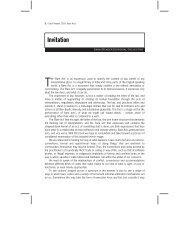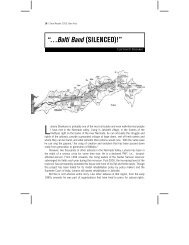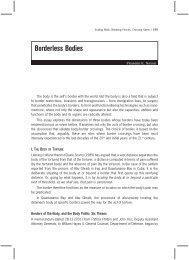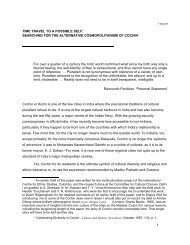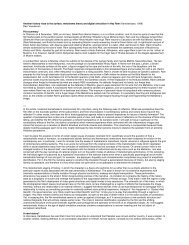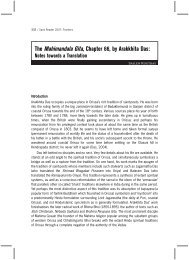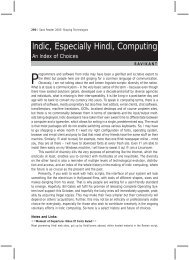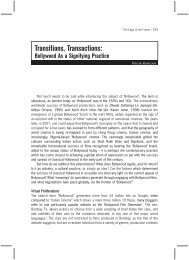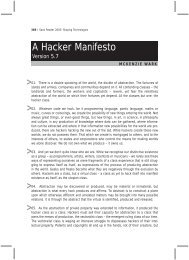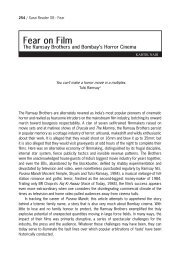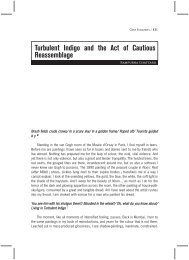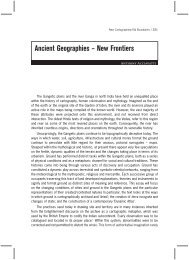Bhudev's Uchronia: - Sarai
Bhudev's Uchronia: - Sarai
Bhudev's Uchronia: - Sarai
You also want an ePaper? Increase the reach of your titles
YUMPU automatically turns print PDFs into web optimized ePapers that Google loves.
Bhudev’s <strong>Uchronia</strong>:<br />
The Temporal Exile of the Colonised<br />
Texts and Margins / 339<br />
Ritwik Bhattacharjo<br />
The word ÂfrontierÊ presumably<br />
means two different things. On the one<br />
hand, it is presented as a border that<br />
divides. Here it would manifest as<br />
something that lies in between. But a<br />
frontier can also stand for a boundary<br />
that restricts the extent of a certain<br />
totality; thereby playing the role of the<br />
perimeter of a given thing, and<br />
functioning as an index of a certain<br />
limit. Dealing primarily with the latter,<br />
this essay is about a certain colonial<br />
experience of temporality that leaves<br />
the colonised beyond a time that they<br />
can call their own. It is an experience<br />
of a politically implemented mode of<br />
temporal dispossession. One may<br />
legitimately claim that this fact is<br />
germane to any discussion of colonial<br />
subjection/subjectivation.<br />
But how and why are the frontier and the border important as concepts within this<br />
scheme? This would have to do with certain moves that Bhudev Mukhopadhyay (1827-<br />
1894), an educationist, thinker and one of the first authors of nationalist discourse in<br />
Bengal, undertakes to come to terms with the fact of the colonised being dispossessed of<br />
temporality. BhudevÊs production of an uchronia, Swapnalabdha Bharatbarsher Itihas<br />
(History of India as Revealed in a Dream), 1 might draw out a certain significance of the word<br />
ÂuchroniaÊ that is most certainly overlooked in the European context where it had been<br />
coined and first used. Charles Renouvier (1815-1903), a well-known 19th-century neo-<br />
Kantian philosopher, is said to have coined the term for the first time in 1857. The subtitle<br />
of RenouvierÊs French work <strong>Uchronia</strong> is Utopia in History ; and the book itself gives us an<br />
alternate history of Europe as it might have been. 2 This notion of uchronia is a transposition<br />
of the notion of the utopic to the textual ground of a historical narrative. It answers the<br />
question: ÂWhat if history had developed differently?Ê3 A trail of divergence therefore can be
340 / <strong>Sarai</strong> Reader 2007: Frontiers<br />
laid from a given history to answer this Âwhat ifÊ question. However, while BhudevÊs text itself<br />
bears the marks of an alternate history, it is not comparable thereby to the numerous<br />
allohistories (a synonym for alternate history) produced by the West. A certain colonial<br />
experience of time contributed to BhudevÊs allohistorical production.<br />
Bhudev has been characterised as a „proud Brahmin‰ whose „orthodoxy was not blind<br />
and had nothing in common with the vulgarities of the Hindu reaction‰ to the colonial project<br />
of social reforms (see below). However, he is said to have seen in the reformist efforts „a<br />
slavish acceptance of British views on Indian society‰. His benign critique of the reformist<br />
milieu, effected in a rather original and theoretical way, has earned him the epithet of being<br />
„the only social theorist that the celebrated age of the Bengal Renaissance produced‰. In<br />
spite of his skepticism regarding both colonial modernity and reformist efforts, his<br />
„aspiration as an official in the colonial bureaucracy‰ has been somewhat remarkable. Tapan<br />
Raychaudhari, one of the first historians to have studied BhudevÊs life and oeuvre, describes<br />
this aspect of BhudevÊs life in detail:<br />
The proud Brahmin was bent on making a success of his career in service and<br />
starting as a teacher in the Calcutta Madrassa (after a brief spell in non-government<br />
schools), he went about as high as any Indian could hope to go in his days – ending<br />
his career as a Class I inspector of schools, an office held by members of the civil<br />
service from time to time. In cash terms the transition was from Rs 50 to Rs 1500<br />
per month, the latter a very considerable income in those days. 4<br />
This story of improvement under the colonial aegis stands in contrast to the usual<br />
accounts of the educated nativeÊs complicated resolve to keep a traditional identity intact<br />
within colonised parameters. This apparent dichotomy in fact resonates well with the tenor<br />
of BhudevÊs oeuvre, which was largely about constructing a „Hindu historical sociology of<br />
European modernity‰ (ibid.). It was the production of the knowledge of modernity from an<br />
indigenous perspective, which was more like bracing up for a confrontation often perceived<br />
as hostile and disempowering, and strategising to avoid the humiliation that might thereby<br />
be incurred.<br />
Bhudev and History<br />
Sudipta Kaviraj, the historian who has discussed BhudevÊs work as a „project of indigenist<br />
social theory‰, still finds Swapnalabdha Bharatbarsher Itihas (hereafter in this essay, SBI ) a<br />
most bewildering text. According to him, it is „difficult even to say what sort of writing it is‰.<br />
Its „intriguingly paradoxical‰ form, which has been touted as an extension of BhudevÊs<br />
enterprise in social theory, is remarkable in its resistance to simple classification. Kaviraj<br />
begins his observations on Bhudev with references to SBI, and ends his essay thus:<br />
In this paper, I have analysed only one of BhudevÊs texts, the Samajik Prabandha,<br />
partly because it is the principal site of his social theorising. But his intellectual<br />
portrait cannot be complete without a supplement, a study of his other, more<br />
quizzical work, Swapnalabdha Bharatbarsher Itihas. That text describes a most
Texts and Margins / 341<br />
extraordinary dream, in which the content entirely violates the customary<br />
expectations one has of a dream narrative. In a dream of astonishing clarity and<br />
consistency, he describes in great, often tiring detail, the social constitution of India<br />
under an imagined un-British rule, twisting the line of Indian history away from what<br />
had actually happened. This shows the insistence of his social thinking; even in his<br />
dreams he is constantly constructing social and political forms. 5<br />
Even if one provisionally accepts that SBI was a certain continuation of BhudevÊs earlier<br />
concerns, one would still end up with the paradox implicit in its form. This may take us to the<br />
interesting observations on history as a form, or the empty formalism of history, made by<br />
Bhudev himself in Samajik Prabandha. Bhudev is acutely aware that history as a Western<br />
science has every possibility of being deployed as an instrument for propagating the idiom of<br />
a certain racial superiority. History is not something that is readily accepted, as it is surpassed<br />
and superseded by accounts committed to the description of national glory. He observes:<br />
⁄ [T]he rules (sutra) of the new historical science that are used in India<br />
(Bhàratavarsha ) are of another variety. All these rules are meant for criticizing the<br />
Indians⁄ The historical science of Europe is still in its infancy. It only has a few<br />
imprecise rules which aid the European authors, learned in Greek, to delineate their<br />
respective national glories (jatigaurab )... By History Europeans tend to understand the<br />
history of the Greeks and their followers, the Romans; and since it is regarded as their<br />
religious literature the Jewish texts are left unmarked by dates. The Greeks and the<br />
Romans were deeply patriotic. Patriotism was a part of their fundamental nature.<br />
Accordingly they have produced their histories with considerable skill. But their only<br />
aim was to declare the glories of their country and their nation. 6<br />
History, and perhaps truth itself, is reducible to a problem of form. This kind of<br />
assertion is made to defend IndiaÊs Puranic literature against the attempts of colonial<br />
scholars to deny it the status of history. Some commentators of BhudevÊs milieu take<br />
purana as a genre that represents poetic compositions on nature and the spiritual world, in<br />
contrast to the descriptions of actual history. But Bhudev thinks otherwise. He writes that<br />
„although the natural world and natural forces are imparted liveliness and endowed with<br />
anthropic ideas, the inspiration for such poetic acts is derived from the historical events<br />
themselves‰. The poets, having experienced actual humans, objects and events, transform<br />
them through various tropes (upama, atyukti, rupakadi alankare bhushito o sharash hoia⁄)<br />
into a mode of poetic history.<br />
The claim of the Puranas to being a part of history is facilitated here through the<br />
legitimisation of a certain literary operation effected on the real raw material that happens<br />
to transpose the factual into the imagined. If history poses a threat to the Puranic tradition<br />
through the formerÊs greater claim to truth, Bhudev will find a ready defence in the lack of<br />
consensus amongst the various historians of Europe on the competing truth claims of this<br />
or that historical account in the intra-disciplinary debates. Now, for once, history is made<br />
subject to the kind of scepticism that its disciplinary rules consider legitimate. It is here that
342 / <strong>Sarai</strong> Reader 2007: Frontiers<br />
one encounters BhudevÊs stubborn argument on truth in history as being primarily not about<br />
a set of inviolable facts, but about a certain form that supposedly looks like truth. To<br />
Bhudev, the success of history in transcending national frontiers is therefore questionable.<br />
By this re-signifying of historyÊs function as a vehicle for human ideation, he enables a<br />
celebration of the mass of Puranic literature as a nationalist narrative of the Indian past.<br />
BhudevÊs abiding anxiety about the colonial appropriation of the symbolic and actual<br />
past of the colonised is seen in his attempts to salvage a certain archive (Puranic texts)<br />
from dismissal by the colonial historiographic operation as material not amenable to being<br />
ordered through discursive architectures. This effort to assert the truth claims of<br />
ÂindigenousÊ narratives as valid history is undoubtedly one of the earliest nationalist<br />
engagements with the question of what constituted history. In the context of BhudevÊs<br />
discussions of ÂhistoryÊ in Samajik Prabandha, one may wonder how to approach BhudevÊs<br />
alternate paradigm. Was the assertion of Puranic ontology in fact a celebration of historical<br />
discourse through the inscription of a new, effective form, an act that rendered the<br />
colonised autonomous and capable of imagining a non-/post- colonial future?<br />
SBI certainly doesnÊt offer us an easy response to that question. In the given situation,<br />
the status of alternate history in the colony presumably remains a decisive issue.<br />
Alternate History in the Colonial Setting<br />
BhudevÊs engagement with history was not to end within the body of his indigenist sociology<br />
found in Samajik Prabandha. It was to return to him in SBI more like a supplement. SBI<br />
might seem to be an innocuous addition to BhudevÊs extant works; moreover, it also seems<br />
to stand by itself as something powerfully idiosyncratic, and not subsumed within his ÂHinduÊ<br />
sociology. SBI represents the sheer force of a form as it appears in a dream, and taken to<br />
be empowering by instituting the autonomy of the colonised. History, one might say, comes<br />
back with a vengeance, but only as an object of dream. The imagined event of the institution<br />
of autonomy of the colonised dons the cloak of historical discourse. In BhudevÊs<br />
conceptualisation, history, which had failed to empower the colonised in their state of<br />
submission, lends its form to the colonised dreaming of autonomy.<br />
This was somewhat inescapable for the two conjoined operations of historical<br />
discourse in the colonial era. History within colonialism was not just an account of the past,<br />
but also a subjectivity and agency shaping the future. Not only did it appraise the past of<br />
the colonised in a manner that justified colonialism, it also denied the ideal of historical<br />
agency to the colonised. History is what the colonised lacked ; it was therefore also the<br />
thing that they most coveted. The colonial rendering of a particular history as a valued<br />
discourse was definitely influential to a great extent. Bhudev does nothing in SBI to<br />
controvert the conventions of a historical prose – and yet the event of Maratha dominance<br />
described in his text is an event that a historical discourse committed to producing the ÂtrueÊ<br />
rendition of the past cannot accept as valid. In BhudevÊs dream, the desire to inhabit history
Texts and Margins / 343<br />
adheres to its discursive form while remaining unable to accept the event of colonisation<br />
inscribed in its content.<br />
BhudevÊs alternate history will be radically different from similar such works produced<br />
in the modern West. Alternate history had been written in Europe since the early 19th century, and has by now made a place for itself in contemporary Western popular culture<br />
as well, whereas the mode has not found acceptance in modern India. It is worth examining<br />
the difference between BhudevÊs project and 19th-century Western alternative histories,<br />
keeping in mind that the colonisers and the colonised clearly have different experiences of<br />
temporality and the historical continuum as well as historical fractures. In order to fully<br />
understand the experience of temporality by the colonised, the Western subject is arguably<br />
required to suspend his/her normative interpretation of history; and also required to<br />
scrutinise the discursive forms in which it is embodied, and through which it is transmitted.<br />
Historian Reinhart KosseleckÊs exposition of the emergence of modern historical<br />
temporality is instructive here. Koselleck plots the emergence of modern temporality – a<br />
temporality that also founds history as a separate order of knowledge – in the temporality of<br />
prognostications, as opposed to the notion of time that was implicit in apocalyptic<br />
prophecies. Prognosis is a „conscious element of political action‰ which steers away from a<br />
certain sacral time – the enunciation of futures that form teleological prophetic statements:<br />
Prognosis produces the time within which and out of which it weaves, whereas<br />
apocalyptic prophecy destroys time through its fixation on the End. From the point<br />
of view of prophecy, events are merely symbols of that which is already known. A<br />
disappointed prophet cannot doubt the truth of his own predictions. Since these are<br />
variable, they can be renewed at any time. Moreover, with every disappointment,<br />
the certainty of approaching fulfilment increases. An erroneous prognosis by<br />
contrast, cannot even be repeated as an error, remaining⁄ conditioned by specific<br />
assumptions. 7<br />
With prognosis, the age of Enlightenment desacralises time and opens up the future as<br />
a sphere of autonomous human intervention. The present becomes thick with speculations<br />
on future events, and history emerges as a domain of human freedom.<br />
Alternate history or allohistory works through the principles of prognosis and weaves<br />
the narrative of other possible futures – those that formed the speculative horizon of any<br />
given present. The present of which alternative futures are narrated is the locus of the point<br />
of divergence from where the alternate concatenations begin. In these instances, allohistory<br />
is nothing other than celebrating the subject (both in the sense of subjectivity within an order<br />
of knowledge and in the sense of political agency) of history that the West would produce.<br />
BhudevÊs alternate history cannot be affiliated with such an enterprise. Far from<br />
articulating a speculative freedom, SBI is marked by an acute weight of temporal<br />
subjection. Alternate history happens to be here quite the reverse of what it would have<br />
meant to 19th-century Europeans. It is characterised by an ingrained despondency rooted
344 / <strong>Sarai</strong> Reader 2007: Frontiers<br />
in the sense of not having an autonomous account of the collective/civilisational self.<br />
Colonial policies were designed and undertaken along the axes of this logic and its<br />
pathological repercussions. Colonial prognosis became the art of denying the colonised not<br />
just agency but also an autonomous experience of time.<br />
SBI begins with a description of the context in which it was written. Apparently, a<br />
relative of Bhudev is writing a book on Indian history. Bhudev is asked to review the text,<br />
but while he is reading the account of the Third Battle of Panipat, he falls seriously ill and<br />
cannot bear the event of the Maratha defeat. It is important to reiterate here that the event<br />
of Maratha victory could well have obviated a colonial intervention amidst the chaos and<br />
instability of the 18th century. Bhudev, unable to accept the erstwhile historical narration of<br />
the events leading to the colonial subjection of India, sets out to perform in his uchronia<br />
what Marathas themselves failed to perform in the world of ÂrealÊ history.<br />
Prima facie, there is nothing unique about BhudevÊs imagination of the Maratha victory<br />
that would make a comparison to other allohistories worthwhile. The critical difference lies<br />
in the two senses in which the term ÂalternateÊ can be used. In the 19th-century European<br />
context, it might well have meant exploring how any given event is fraught with different<br />
possible outcomes. But SBI was an alternate history in the sense of history (of autonomy)<br />
being unavailable otherwise. It was a response generated from a sense of a certain profound<br />
and profoundly experienced lack that was very much a product of colonial rule; or more<br />
precisely, a product of the colonial operations in the complex realm of temporality. Bhudev<br />
did attempt to save the past of the colonised from being appropriated and disparaged as<br />
ahistorical. But another acute concern for the colonised was that the future too was subject<br />
to the colonial extrapolations from which the colonised ÂcitizenÊ was excluded, owing to once<br />
again an inexorable rationale and dialectic of domination and submission.<br />
For instance, Lord MacaulayÊs speech in the English House of Commons (delivered on<br />
10 July 1833) is worth citing in detail. This was a moment when the empireÊs scandalous<br />
beginnings in India were being palliated through the relentless deployment of the selfserving<br />
logic of colonial historiography, a discourse which explains away the progression of<br />
the colonial endeavour as a process inexorably destined:<br />
[⁄] The calamities through which that country passed during the interval between<br />
the fall of the Mogul power and the establishment of the English supremacy were<br />
sufficient to throw the people back whole centuries⁄ The people were ground<br />
down to the dust by the oppressor without and the oppressor within, by the robber<br />
from whom the Nabob was unable to protect them, by the Nabob who took<br />
whatever the robber had left to them. All the evils of despotism, and all the evils<br />
of anarchy, pressed at once on that miserable race. 8<br />
Through the consistent rhetorical staging of such a desolate spectacle, it was easy to<br />
argue in favour of a supposedly paternal despotism as an effective strategy of political<br />
governance. A certain historiography was mobilised to legitimate the British subjection of<br />
India, prodding the coloniser to create ÂcitizensÊ out of ÂslavesÊ and vindicating the
Texts and Margins / 345<br />
colonising/civilising mission. The ÂpatronÊ coloniser waits for the Âproudest dayÊ when his<br />
protégé becomes self-sufficient, allowing him to finally end his rule. Macaulay continues:<br />
To have found a great people sunk in the lowest depths of slavery and superstition,<br />
to have so ruled them as to have made them desirous and capable of all the<br />
privileges of citizens, would indeed be a title to glory all our own. 9<br />
And as critic Ramchandra Guha astutely remarks in relation to SBI :<br />
The great Bengali writer, Bhudev Mukhopadhyay, once published a marvellous alternate<br />
history of India⁄ which speculated on what might have been if the British had not<br />
conquered the subcontinent. Bhudev assumed that in such an eventuality, Indians<br />
would have ruled themselves. In truth, there was no earthly chance of this happening.<br />
The choice was between the French, the Dutch, the Portuguese and the British. 10<br />
There are indications in Samajik Prabandha that Bhudev would have agreed completely<br />
with Guha. At the very beginning of his text, Bhudev clarifies to his Irish interlocutor that<br />
„[⁄] We donÊt want independence from the colonial authorities at least for some time to<br />
come‰ 11 . This is a grudging admission of the time of colonial tutelage, and no alternative is<br />
being brought forth here. The pathology of existing and functioning as the colonial protégé<br />
was something that had been clearly introjected by the colonised by the time Bhudev was<br />
writing, and many of his contemporaries had similar perceptions of their future. The<br />
colonised had already submitted to this vision; and from its inception, the colonial<br />
historiographic project had been given to a certain production of the time of tutelage,<br />
making such submission by its ÂcitizensÊ possible. William JonesÊ pronouncements in the<br />
famous 10th Anniversary Discourse of the Asiatic Society can be considered a case in point:<br />
He (one who reads history) could not but remark the constant effect of despotism<br />
in benumbing and debasing all those faculties which distinguish men from the herd<br />
that grazes; and to that cause he would impute the decided inferiority of the most<br />
Asiatic nations, ancient and modern, to those in Europe who are blest with happier<br />
governments⁄ In these Indian territories, which Providence has thrown into the<br />
arms of Britain for their protection and welfare, the religion, manners, and laws of<br />
the natives preclude the idea of political freedom; but their histories may possibly<br />
suggest hints of prosperity, while our country derives essential benefit from the<br />
diligence of a placid and submissive people‰⁄ 12<br />
A historical explanation had to be given for the „inferiority‰ of the Asiatic „herd‰, a quality<br />
that suits their being appropriated submissively into the role of protégé to those effecting the<br />
colonising mission. The project of colonial historiography is essentially directed to the purpose<br />
of recovering a past that the colonised themselves supposedly cannot recuperate. This act of<br />
particular inscription functions as an instrument for the legitimising of colonial rule. The agent<br />
who recovers the past is also the agent who rules over the future of the colonised. Colonial<br />
authority straddles both temporal planes of the colonised, the future as well as the past, while<br />
the present is the harrowing moment of literal and epistemic subjection.
346 / <strong>Sarai</strong> Reader 2007: Frontiers<br />
Mired between the colonial extrapolations of a future of tutelage and the colonial<br />
appropriation of the Indian past, the colonial subject invents a dream, an uchronia. This<br />
uchronia is not just a dream of autonomy; it is also a place to which the colonised had been<br />
exiled by the concerted effort of colonial ideologues.<br />
The effort to invent an uchronia therefore stands testimony to a certain larger trend in<br />
the colonial-nationalist politics of time. In colonial elaborations of temporality, the present<br />
was a tangible zone of subjection; a prolonged future was given to the time of tutelage of<br />
the colonised under the coloniserÊs supervision; and the past was often a disparaged<br />
fiction, a product of Âungoverned imaginingsÊ. BhudevÊs uchronia, the imagination of a nonexistent<br />
time, is an audacious reworking of this expulsion from the temporal through the<br />
rendering of a simple reversal of a historical event. The Marathas manifest in the text as<br />
the founders of the Indian nation, and the event of colonial subjection is obviated by the<br />
Maratha initiative at nation building. This paradoxical reversal attempts to erase the fact of<br />
colonial subjection from Indian history, and avoids confronting the colonial delineation of the<br />
temporal subjection of the colonised. A significant act of evasion emerges here as a deeply<br />
despondent admission that the symbolic manipulation of time (the historical past, the<br />
present as well as future) is all that one can offer in terms of a concrete claim to true<br />
agency, authentic citizenship, actual sovereignty. Upon this oneiric foundation of desired<br />
autonomy, the colonisedÊs actual exile from time (which in the colonial context is mostly<br />
synonymous to history) is writ large.<br />
Afterword<br />
The term ÂuchroniaÊ, first used in the European context merely as what today would be<br />
considered as a synonym for alternate history, assumes a significantly different sense when<br />
used to characterise SBI. <strong>Uchronia</strong>, taken in its literal sense, is more a somewhat poignant<br />
term for the temporal experience of the colonised, than a utilitarian strategy for<br />
demarcating the horizon of alternate history, i.e., a past that did not occur. This ÂpastÊ is<br />
certainly discernible in BhudevÊs text. But SBI is more than simply an alternate history. As a<br />
text created in response to the colonial act of deporting the colonised from the territory of<br />
time, BhudevÊs uchronia is equivalent to the excruciating infiltration of the colonised into the<br />
domain of exile beyond the temporal frontier. Denied time, yet compelled into the<br />
production of autonomy through the only means available – uchronia – the colonised cannot<br />
escape the condition of their subjection, even if they have somehow retained the capacity<br />
to narrate themselves into history through the mode of visionary dream.<br />
Acknowledgements<br />
I thank Dr Pradip Kumar Dutta, who is also studying the life and work of Bhudev, for his immensely helpful<br />
critical insights regarding the ideas developed in this essay. I also thank Prakriti Mitra at Jadavpur University<br />
for her support.
Notes<br />
Texts and Margins / 347<br />
1. (Ed.) Pramathanath Bishi. Bhudev Rachanasambhar [The Collected Works of Bhudev] (Mitra and Ghosh,<br />
B.S.1375, 1968, Kolkata), pp. 341-74. All Bhudev quotes in this essay are from his text „Samajika<br />
Prabandha ‰ in BishiÊs compilation.<br />
2. Charles Renouvier. Uchronie: lÊutopie dans lÊhistoire, esquisse historique apocryphe du développement de<br />
la civilisation européenne tel quÊil nÊa pas été, tel quÊil aurait pu être (Bureau de la Critique Philosophique,<br />
1876, Paris).<br />
3. For an account of alternate history as a genre, see Gavriel Rosenfeld, „Why Do We Ask ÂWhat IfÊ?<br />
Reflections on the Function of Alternate History‰, in History and Theory, Vol. 41, No. 4, theme issue on<br />
Unconventional History, pp. 90-103 (December 2002). For an account of RenouvierÊs work and similar<br />
19th-century European-language texts, see Paul Alkon, Origins of Futuristic Fiction (Georgia University<br />
Press, 1987, Athens), pp. 115-18.<br />
4. Tapan Raychaudhuri. Europe Reconsidered: Perceptions of the West in Nineteenth-Century Bengal (Oxford<br />
University Press, 1988, New Delhi), pp. 54-55.<br />
5. Sudipta Kaviraj. „The Reversal of Orientalism: Bhudev Mukhopadhyay and the Project of Indigenist Social<br />
Theory‰. In (eds.) Vasudha Dalmia and Heinrich von Stietencron, Representing Hinduism: The Construction<br />
of Religious Traditions and National Identity (Sage, 1995, New Delhi), pp. 278-79.<br />
6. (Ed.) Pramathanath Bishi, op. cit., pp. 22-23, 40-41.<br />
7. Reinhart Koselleck. Futures Past: On the Semantics of Historical Time (MIT. Press, 1985, Cambridge), pp.<br />
10-11.<br />
8. Thomas Babington Macaulay. Speeches, Vol. 1 (Redfield, 1853, New York), pp. 260-61, 280-81.<br />
9. Ibid.<br />
10. Ramachandra Guha. „Confessions of a Coconut: Even If the British Were Philistines, They Were<br />
Gentlemen‰. The Telegraph, 21 February 2004.<br />
11. (Ed.) Pramathanath Bishi, op. cit., p. 4.<br />
12. William Jones. In (ed.) Sibdas Chaudhuri, Proceedings of The Asiatic Society, Vol. 1 (The Asiatic Society,<br />
1980, Calcutta), pp. 206-07.



